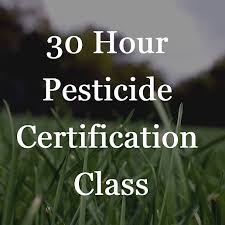
Understanding pesticide application is crucial for anyone involved in agriculture, landscaping, or pest control. Whether you're a farmer looking to protect your crops or a professional seeking certification, knowledge of pesticides is essential for safe and effective use. New York offers structured training programs to ensure applicators are equipped with the necessary skills and knowledge. This article will explore the importance of proper pesticide education, the structure of certification courses, and how you can prepare for a successful career in this field.
The Role of Pesticides in Modern Agriculture
Pesticides are indispensable tools in modern agriculture and pest management. They help control harmful pests, increase crop yield, and ensure food safety. However, the misuse of pesticides can have severe consequences, including environmental damage, harm to non-target species, and risks to human health. This dual-edged nature of pesticides makes proper training and certification crucial for every applicator.
In New York, regulations are stringent, ensuring only qualified individuals handle and apply pesticides. The training programs not only educate participants about proper usage but also emphasize environmental safety and compliance with state laws.
Key Elements of Pesticide Training
A good pesticide training program covers a range of essential topics, including:
Pesticide Safety: Understanding the risks associated with pesticide use and learning how to minimize exposure.
Application Techniques: Mastering the correct methods of applying pesticides to maximize effectiveness and reduce wastage.
Environmental Considerations: Learning how to protect non-target organisms and prevent contamination of soil and water sources.
Legal and Regulatory Compliance: Familiarizing yourself with state and federal laws governing pesticide usage.
Each of these elements is vital to becoming a competent and responsible pesticide applicator.
Certification Requirements in New York
To legally apply pesticides in New York, individuals must obtain the appropriate certification. The certification process includes a combination of coursework, examinations, and practical experience. Here are the primary steps:
Education: Enroll in an approved pesticide training program. These courses are designed to provide both theoretical knowledge and hands-on experience.
Examinations: Pass the required certification exams, which test your understanding of pesticide safety, application techniques, and legal requirements.
Experience: Gain practical experience under the supervision of a certified applicator.
Continuing Education: Stay up-to-date with industry developments by attending additional training sessions and renewing your certification periodically.
What to Expect in a Pesticide Course
Pesticide courses are structured to balance theoretical knowledge with practical training. Participants can expect to learn about:
Pest Identification: Recognizing different pests and understanding their behavior.
Chemical Properties of Pesticides: Studying how various pesticides work and their potential effects.
Equipment Handling: Learning to operate and maintain application equipment safely.
Integrated Pest Management (IPM): Exploring sustainable pest control strategies that combine chemical and non-chemical methods.
The courses also include interactive sessions, such as workshops and field exercises, to reinforce learning outcomes.
Benefits of Completing a Pesticide Course
Completing a pesticide course offers several advantages, including:
Enhanced Skills: Gain the knowledge and expertise needed to handle pesticides safely and effectively.
Career Opportunities: Open doors to various career paths in agriculture, landscaping, and pest control.
Compliance: Ensure compliance with New York State regulations and avoid penalties.
Environmental Stewardship: Contribute to sustainable practices by minimizing the environmental impact of pesticide use.
Challenges in Pesticide Application
Despite its benefits, pesticide application comes with challenges. These include:
Health Risks: Exposure to pesticides can lead to health issues if proper precautions are not taken.
Environmental Impact: Misuse can harm ecosystems and contaminate natural resources.
Regulatory Compliance: Navigating complex regulations can be daunting for new applicators.
Proper training helps address these challenges by equipping individuals with the skills to apply pesticides responsibly and effectively.
Preparing for Certification Exams
Success in pesticide certification exams requires thorough preparation. Here are some tips:
Study the Material: Review the course materials carefully and focus on key topics.
Take Practice Tests: Familiarize yourself with the exam format and types of questions.
Join Study Groups: Collaborate with peers to share knowledge and insights.
Seek Guidance: Consult instructors or mentors for clarification on complex topics.
In the Center of It All
In the heart of pesticide training lies the 30 hour pesticide course NY, a comprehensive program designed to meet the certification requirements. This course offers a balanced blend of classroom instruction and practical experience, ensuring participants are well-prepared to handle the responsibilities of pesticide application. With a focus on safety, effectiveness, and environmental stewardship, this program is a vital step for anyone seeking to excel in this field.
Maintaining Certification
Once certified, applicators must fulfill continuing education requirements to maintain their credentials. This involves attending refresher courses and staying updated on industry advancements. Keeping your certification current demonstrates your commitment to professionalism and responsible pesticide use.
Advancing Your Career in Pesticide Application
Certification is just the beginning. To build a successful career in pesticide application, consider the following strategies:
Specialize: Focus on specific areas, such as agricultural pesticides, urban pest management, or turf management.
Network: Join professional organizations and attend industry events to connect with peers and stay informed about trends.
Pursue Advanced Training: Enroll in advanced courses to deepen your knowledge and expand your skill set.
Stay Informed: Keep up with new technologies, products, and regulations to remain competitive.
Conclusion
Becoming a certified pesticide applicator in New York is a rewarding journey that combines rigorous training, hands-on experience, and a commitment to safety and environmental stewardship. By completing a comprehensive training program and maintaining your certification, you can contribute to sustainable practices and protect both human health and the environment. Whether you’re starting your career or looking to enhance your skills, the path to certification is a worthwhile investment in your future.















